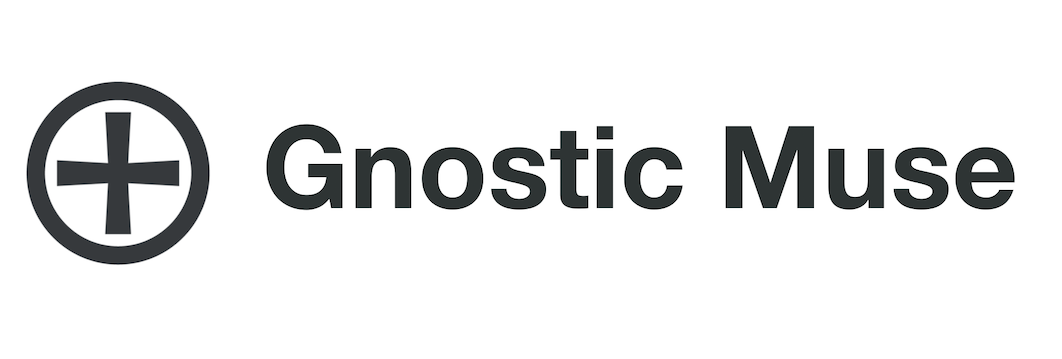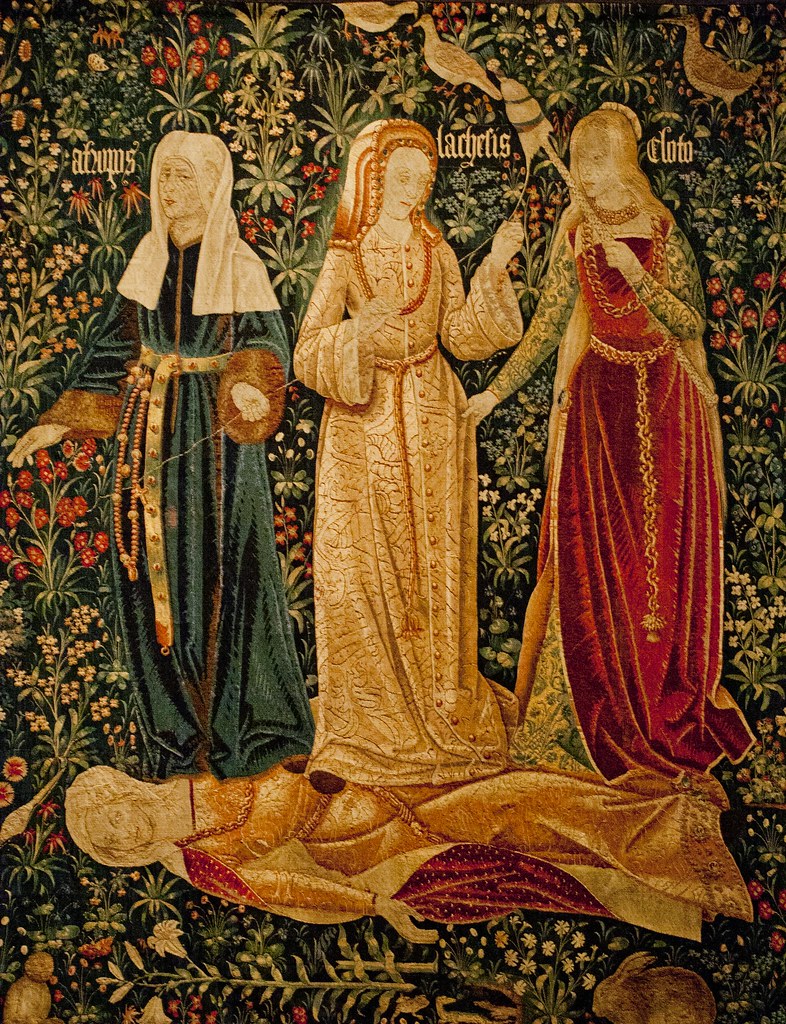“Listen Fates, who sit nearest of gods to the throne of Zeus, and weave with shuttles of adamant, inescapable devices for councels of every kind beyond counting, Aisa, Clotho and Lachesis, fine-armed daughters of Night, hearken to our prayers, all-terrible goddesses, of sky and earth. Send us rose-bosomed Lawfulness, and her sisters on glittering thrones, Right and crowned Peace, and make this city forget the misfortunes which lie heavily on her heart.”
-Pindar (ancient Greek lyrical poet), Hymn to the Fates
Fate is the principle of predetermination, that the events of life are fixed and unalterable, put in place by greater forces. The word fate is from the Latin fatum, “that which has been spoken”. Fate implies an unalterable destiny, and is contrasted conceptually with free will.
In ancient Greek mythology the Fates were three goddesses who determined the destiny of every person. Clotho spun the thread of a person’s life, Lachesis measured the length of the thread, and Atropos cut the thread, signifying the time and manner of death.
Karma
What is the reason for fate? The gnostic teaching is that fate is determined by karma, the cosmic law of cause and effect. Past actions determine future circumstance.
The teaching of karma is powerful in that it leads us to accept our current situation, and take responsibility and positive action to change our future. Karma can be overcome through conscious deeds and voluntary sufferings, sacrificing and serving humanity.
Ego
The root of karma is in the ego, the selfish parts of our psychology which mistake the pursuit of desire for true happiness. The ego does not understand the truth of interdependence and interconnection with all beings, it thinks it is separate.
The key to liberation from karma is dissolving the ego, renouncing desire from which the ego is born and perpetuated.
Without this type of work, karma becomes more complicated, continuing into our next lives, “fate” becomes more entrenched, and we become less free.
Karma, (our predetermined fate based our past actions) can be either pleasant or unpleasant. Often karma is unpleasant because our ego has acted unethically and the results are painful, but karma can also be a pleasant trap based on positive actions. Sometimes this positive karma is called destiny, which has a more pleasant connotation than fate.
The Being
A great mystery of the path is the relationship of our inner Being to our essence, the spark of consciousness. The essence is subject to the law of karma and therefore, fate, because it is enmeshed with our physical existence.
The Being, God, is omnipotent and omniscient. The Being is the chess master who sees hundred of moves ahead and tries to help us navigate toward a conscious life.
The Being does not work miracles, in other words does not change our fate to be in line with our desires. But the relationship of the Being with our essence is crucial, and with this connection intact the essence has more agency to navigate the twisted labyrinth of fate.
Accepting Fate
Accepting fate does not necessarily mean being resigned to it.
When an essence yearns for the divine it will fight to break free from the cage of karma. However, karma, as our own psychological ego, must first be seen clearly, and accepted in order to be dismantled within ourselves.
The first step in the process of liberation is comprehension of the ego. This is done through meditation because serenity and stillness is necessary for the consciousness to unfold and grant objective comprehension.
There is great wisdom in the Zen saying: Zen is ordinary life.
We cannot be running away in a hurry from the ego, or fighting it blindly. In other words, we have to be courageous enough to see our fate clearly. Patiently, with the help of our Divine Mother, the ego is accepted and understood for what it is, and She is then able to eliminate it and free the bit of trapped consciousness.
Samael Aun Weor said “Initiation is your own life.”
The ancient Greek philosopher Seneca said, “It does not matter what you bear, but how you bear it.”
Let us walk through daily life with open eyes and a clear mind and not run away from reality.
Changing Fate
“If you want to know your past life, look at your present condition.
If you want to know your future life, look at your present actions.”
-Padmasambhava
Our monad (inner Being) must work within the confines of the law of karma, but this law is still negotiable. Our Divine Mother assists us in navigating and overcoming fate. And the cosmic, universal Christ force descends into this fated existence in order to redeem those who are sufficiently prepared.
The only way to definitely change one’s fate is through the initiatic path, the great work of renouncing life as a creature subject to fate, and being reborn as a servant of God and humanity. This process is arduous and long, with dangers within and without. In his teachings of the initiatic path, Master Samael included information on assistive practices such as astrology, divination, and magic.
Knowing Fate
Divination practices have always coexisted with esoteric teachings; these tools can be used for egoic purposes or to provide help on the path.
The practice of astrology uses the positions of celestial bodies to understand earthly events. On a personal level the planetary and zodiacal configurations at birth reflect the karma of one’s own essence this lifetime.
Through astrology it is possible to know one’s fate, which can either be a helpful tool to comprehend our karma, or another means of fascination and psychological complication.
Magic uses various practices to change one’s circumstances, to overcome fate. Black magic is done in accordance with self-will and desire. White magic is done in accordance with God’s will. White magic is only possible with the death of the ego and the awakening of the consciousness.
Self-Will
There is a notion within new-age spirituality that the self-will can overcome fate. This idea has its roots in the 17th century age of enlightenment, which Master Samael refers to as the “age of obscurity”, as it was the birth of atheistic materialism. The idea is that intention and self-will can fulfill our desires.
Self-will is based in the ego, the conditioned consciousness. Self is an illusion, a fraction of the light of the consciousness trapped in a cycle of chasing pleasure and avoiding pain.
Only the consciousness of the Being sees the totality with wisdom, while the self sees a small, subjective piece. Therefore actions based in self-will always perpetuate more karma.
God’s Will
To know and act from God’s will is the aim of any initiate of the path of wisdom. The consciousness, hypnotized by desire, must be liberated through meditation, transmutation, comprehension, and ego death.
Prayer is the perfume of the wise. Faith is stepping out of fear and desire and into the mystical space of God. Knowing God’s will sometimes means a simple willingness to act in accordance with the ethics and responsibilities of the path.
Our fate will change with this work, in accordance with the will of our inner Being, the aim being the exaltation of the soul and entrance into the mystery.

